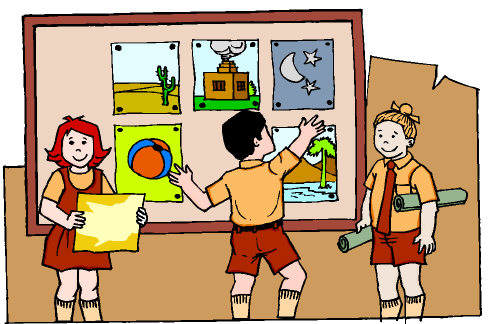To link to this article from your blog or webpage, copy and paste the url below into your blog or homepage.
Montessori: A Modern Approach
a book by Paula Polk Lillard
(our site's book review)
The Montessori approach to early education includes respect, win-win conflict resolution, active listening, and encouraging kids to find out for themselves and to choose as much as possible. The environment contains not only what nourishes a child physically and mentally, but also an absence of obstacles to growth and learning. It is win-win and ecologically sound. Kids learn cooperation spontaneously, and are not forced into it like in normal schools. Part of the reason for this is that the environment is different: the kids are not forced to compete. There’s no built-in win-lose and comparing and grading.

Children exploring their talents
Children learn ownership and responsibility toward the classroom very quickly, because it truly is set up for them and it is theirs. It is child-centered because it is the children who are to be learning and growing in it. It is not teacher-centered like most classrooms because the teacher isn’t the one expected to be the main learner; s/he’s the facilitator of their learning. Kids learn to feel responsible for each other in these schools. Much of this is because—unlike in other schools—they are allowed to help each other and communicate with each other in their learning processes, and are only restricted when they interfere with the rights of others. This Montessori teaching method, invented by Maria Montessori in 1907, is all in harmony with the educational classic How Children Fail, by John Holt.
“Montessori teachers function as a team, with two teachers per class, usually an experienced teacher and an assistant. This team approach gives the child an option as to which adult he prefers to relate to at any given time . . .” (Like MC childcare, this solves many problems and creates better opportunities; moreover it changes the normal win-lose context to win-win much more often. See Why Register for an MC?.)

Registering for MC search and match

What remained when most social tasks were exteriorized in the 1950s was the isolated ‘nuclear family,’ held together less by the functions its members performed as a unit than by fragile psychological bonds that are all too easily snapped
Maria Montessori said that more attention should be given to children and less to materialism in advanced societies. She also disapproved of the isolated nuclear family context, realizing that connectedness to neighborhood and community is what unites mankind in brotherhood. She proposed MC-hub-like Children’s Houses in apartment buildings for the benefit of parents and children alike. She advocated child-proofing the environments where kids will be. Montessori teachers are seen as examples to emulate for parents who see the teachers show respect for the child and faith in his abilities. Parents are encouraged to visit the school and experience teacher-child attitudes. Many revamp negative or skeptical attitudes because of the teachers.

Montessori teachers respect kids and are seen as examples to emulate for parents
Google founders Larry Page and Sergey Brin credit their Montessori education as the key to their success, so in Google employees are told to spend one day per week in self-directed learning—like in Montessori schools. In her book Julia Child and Company, Ms. Child says that Montessori learning taught her to love working with her hands. Video game pioneer Will Wright created The Sims, SimCity, and Spore' all widely successful games. He says that SimCity comes right out of Montessori, where he learned the joy of discovery. Jimmy Wales credits Montessori for inspiring him to found Wikipedia, the online encyclopedia. Amazon CEO Jeff Bezos credits Montessori as the inspiration of how Amazon develops ideas in new markets. Alexander Graham Bell, who invented the first practical telephone, helped create the first Montessori school in Canada. Thomas Edison, inventor of the incandescent light bulb and holder of 1093 patents, kickstarted four Montessori schools. And PBS host Fred "Mister" Rogers pushed for expanding Montessori education. There are thousands of Montessori schools around the world.





